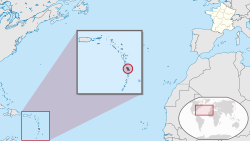Martiniquan
| Martinique | |||
|---|---|---|---|
| Overseas region and department of France | |||
|
|||
 |
|||
| Country |
|
||
| Prefecture | Fort-de-France | ||
| Departments | 1 | ||
| Government | |||
| • President of Executive Council | Alfred Marie-Jeanne | ||
| Area | |||
| • Total | 1,128 km2 (436 sq mi) | ||
| Population (January 2013) | |||
| • Total | 385,551 | ||
| • Density | 340/km2 (890/sq mi) | ||
| Demonym(s) | Martinic(qu)an, Martiniquais (m) / Martiniquaise (f) |
||
| Time zone | ECT (UTC-04) | ||
| ISO 3166 code | MQ | ||
| GDP (2012) | Ranked 23rd | ||
| Total | €8.35 billion (US$10.7 bn) | ||
| Per capita | €21,527 (US$27,688) | ||
| NUTS Region | FRA | ||
| Website | Prefecture, Territorial collectivity | ||
Martinique (French pronunciation: [maʁtinik]) is an insular region of France located in the Lesser Antilles in the eastern Caribbean Sea, with a land area of 1,128 square kilometres (436 sq mi) and a population of 385,551 inhabitants as of January 2013. Like Guadeloupe, it is an overseas region of France, consisting of a single overseas department. One of the Windward Islands, it is directly north of Saint Lucia, southeast of Puerto Rico, northwest of Barbados, and south of Dominica.
As with the other overseas departments, Martinique is one of the eighteen regions of France (being an overseas region) and an integral part of the République française (French Republic). As part of France, Martinique is part of the European Union, and its currency is the euro. The official language is French, and virtually the entire population also speaks Antillean Creole (Créole Martiniquais).
Martinique owes its name to Christopher Columbus, who sighted the island in 1493, and finally landed on 15 June 1502. The island was then called "Jouanacaëra-Matinino", which came from a mythical island described by the Tainos of Hispaniola. According to historian Sydney Daney, the island was called "Jouanacaëra" by the Caribs, which means "the island of iguanas".
...
Wikipedia


